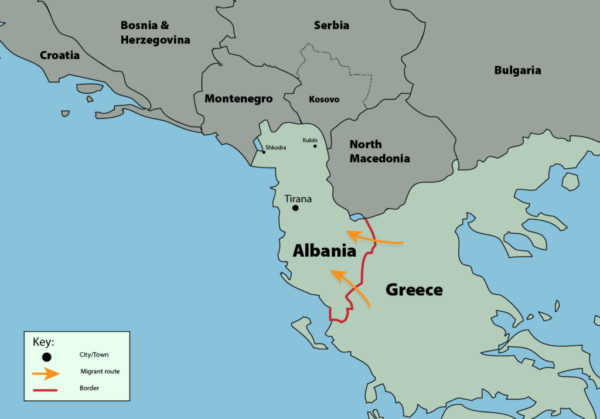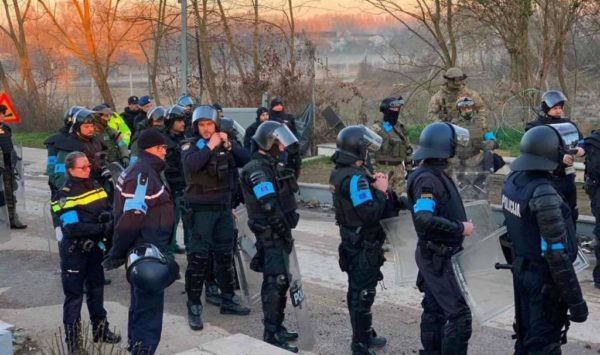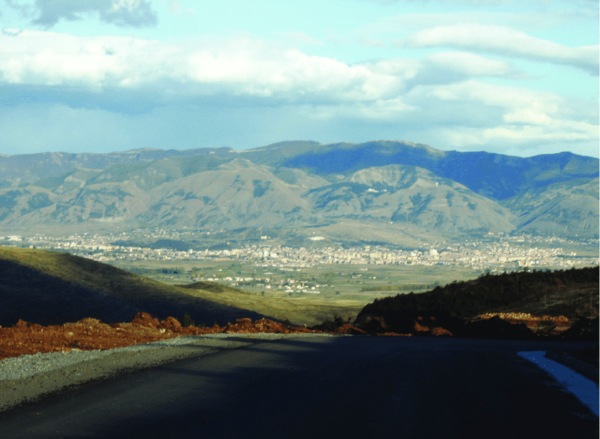I want to give my testimony to make [it] better for the next people
| 18.01.2021 | Albanian-Greek Border, south eastern Albania | Anonymous Partner | 40.4329453, 20.8003743 | Albania | Greece | no | no | yes | yes | no | no | yes | 18 - 18 | 50 | Syria, Morocco, Algeria, Tunisia | fingerprints taken | Unknown number | denial of personal belongings, exposure to dangerous weather conditions | <p>Albanian police officers and soldiers; Greek police</p> |
The respondent is an 18-year-old Moroccan man. For several weeks, he had rented a hotel room in Durres, a port city in western Albania with 4 other people. At 5:00 a.m. on the 17th of January 2021, 10 officers, described by the respondent as Albanian police, came to the hotel. All of whom wore blue and red uniforms. They knocked on the respondent’s door and explained to the men that they needed to come to the station and give their fingerprints. According to the respondent, the hotel is well known to the Albanian police, who routinely come to “look for people” if there is trouble in the local area. As a result, he was not afraid and felt reassured that nothing untoward would occur. Along with his four roommates, the respondent was led outside. A detail that would later prove catastrophic for the respondent and his group, the officers reportedly rushed their exit from the hotel and did not allow anyone to gather their personal belongings. Money, mobile phones, passports, and, crucially, sleeping bags and winter clothing were all left in the room.
Some were forced out in only a T-shirt.
The respondent stated that outside waited six vans which he reported to be Hyundai H3s. That the police had assembled in such a large number with numerous vehicles suggests this was a planned operation. The respondent reports being loaded into one of the vehicles along with eight others. In the back were metal seats and, although it lacked cells, there was no ventilation. Alongside his roommates, the respondent stated that other people were placed in the vans. He claimed they were “taken from the street" and described them as those “who sell papers or try to earn money working in the streets.” According to the respondent, the number of people gathered by the police totalled 50. Algerians, Moroccans, Egyptians, Iraqis and Syrians were all present. Over six minors were also reportedly among them. Inside the van, the respondent reported seeing “the Albanian birds” (in reference to the double-headed eagle on Albania’s flag) and the sign of the European Union. He did not explain what this was displayed on. The vans reportedly then drove directly to the Greek-Albanian border. The respondent estimates that this drive lasted approximately four hours. But, with everyone lacking mobile phones, the respondent could not verify the location. Greece and Albania share a 250km land border. Unlike other hotspots monitored by the BVMN, the frontier between the two countries is largely porous, often lacking fencing and clear demarcation. [caption id="attachment_16930" align="aligncenter" width="445"] The Greek-Albanian border[/caption] During this journey, the respondent reported witnessing an alarming incident. It began when one man asked the officers if he could go to the toilet. They pulled over, next to a wooded area, and let the man relieve himself on the verge. Yet one officer stood “too close”, which caused the man to complain as he did not want anyone to “look at him while he was naked”. Their argument soon escalated and the officer went to strike the man. However, all of the other men rushed the officer to protect their companion. Amid this commotion, one man fled into the wood. The officers followed in pursuit where the respondent lost sight of them. Then, he claimed that three gunshots rang out. Shortly afterwards, the officers returned with the man. He was unharmed. The respondent could not see whether these shots were fired at the man or into the air. At the Greek-Albanian border, the men were brought to a camp. By this time, it was around 8:00 or 9:00 p.m. Again the respondent was unsure of his whereabouts, although he noted that “it was an official looking camp with an asylum office and translators.” Without more information it is impossible to ascertain where this camp is. While at the camp, the respondent stated that he requested asylum to camp officials, who reportedly replied that he "could not ask for asylum here, and must leave the country”. After a short wait, the respondent describes how he and his group were loaded into what he called “army cars.” They were accompanied by what four officials, referred to by the respondent as Albanian military officers. None of the men received material assistance at the camp. They were still as they had been taken from the hotel: without phones, sleeping bags, winter clothes or money.
The Greek-Albanian border[/caption] During this journey, the respondent reported witnessing an alarming incident. It began when one man asked the officers if he could go to the toilet. They pulled over, next to a wooded area, and let the man relieve himself on the verge. Yet one officer stood “too close”, which caused the man to complain as he did not want anyone to “look at him while he was naked”. Their argument soon escalated and the officer went to strike the man. However, all of the other men rushed the officer to protect their companion. Amid this commotion, one man fled into the wood. The officers followed in pursuit where the respondent lost sight of them. Then, he claimed that three gunshots rang out. Shortly afterwards, the officers returned with the man. He was unharmed. The respondent could not see whether these shots were fired at the man or into the air. At the Greek-Albanian border, the men were brought to a camp. By this time, it was around 8:00 or 9:00 p.m. Again the respondent was unsure of his whereabouts, although he noted that “it was an official looking camp with an asylum office and translators.” Without more information it is impossible to ascertain where this camp is. While at the camp, the respondent stated that he requested asylum to camp officials, who reportedly replied that he "could not ask for asylum here, and must leave the country”. After a short wait, the respondent describes how he and his group were loaded into what he called “army cars.” They were accompanied by what four officials, referred to by the respondent as Albanian military officers. None of the men received material assistance at the camp. They were still as they had been taken from the hotel: without phones, sleeping bags, winter clothes or money.
"We were really lost."
These supposed military officers drove the men around a wooded area near the border for twenty minutes. The respondent explained: “they drove us … not even on a track, just randomly in the woods, it was really dangerous.” At sporadic intervals, the officers stopped the vehicle and dumped the men in pairs in the forest. The respondent believed that this occurred inside Greek territory. On top of demonstrating an explicit attempt to disorientate the men, this placed the group at acute risk of hypothermia and exposure. Average nightly temperatures in this region range between -3 and 4 degrees Celsius in January. The respondent reported that, once the vehicle was empty, the officers departed, leaving the men scattered around the area. The respondent did not know where he was nor which direction to go in.
At this point, it started to snow.
Eventually, the respondent managed to rendezvous with other men and formed a small group of 8. He claimed to have seen over 50 people in groups of various sizes in the vicinity. Many of whom had been with him at Durres. After walking some hours through the wintry night, the group sought refuge in a stable, where they hoped to wait out the freezing temperatures. After what the respondent said was a “horrible night”, the group set off to try and re-enter Albania. Now that it was light, they could get their bearings and had a rough idea of which way to go. However, as soon as they crossed the Albanian border, the respondent was apprehended by what he alleged were Frontex officers. He described them as wearing balaclavas and black uniforms which displayed the flags of Poland and Germany. The respondent also documented that the officers had two white Range Rovers, with the flags of Poland and Germany on their registration plates. Since they were apprehended almost instantaneously after crossing the border, the respondent also believed that the officers had been tracking the group for some time. In 2019, the European Union’s border agency launched an operation in Albania, its first outside the bloc. Albania, which opened EU membership talks in June 2019, is receiving help from Frontex with “border control” and “tackling cross-border crime.” By 2027, the agency expects to deploy 10,000 border and coast guards to help external countries cope with migrants. [caption id="attachment_16931" align="aligncenter" width="441"] German Frontex officers in Greece[/caption] It is therefore not implausible that these officers were members of Frontex, especially when coupled with the respondent's descriptions of their uniforms and vehicles. The respondent reports that these officers loaded the men into the two vehicles, drove them back to the same camp near the Albanian-Greek border, when they were handed over to the Albanian authorities. This time, their fingerprints were taken. Like before, three officers transported the men to the Greek-Albanian border and left them there. Two officers drove the van, while one sat in the back with the men.
German Frontex officers in Greece[/caption] It is therefore not implausible that these officers were members of Frontex, especially when coupled with the respondent's descriptions of their uniforms and vehicles. The respondent reports that these officers loaded the men into the two vehicles, drove them back to the same camp near the Albanian-Greek border, when they were handed over to the Albanian authorities. This time, their fingerprints were taken. Like before, three officers transported the men to the Greek-Albanian border and left them there. Two officers drove the van, while one sat in the back with the men.
“The children were too cold”
In this border area, the respondent encountered several Syrian families. He saw that the women and children were suffering immensely due to the cold, so he lit a fire and invited them over. Once everyone had warmed themselves the men left. The respondent stated that he did not know what they were doing there or what happened to them. Having endured sub-zero temperatures and two pushbacks, a split emerged in the group. Many wanted to try again to enter Albanian, others wanted to return to Greece. According to the respondent, however, when these men tried to continue into Greece they were prevented from doing so by what the respondent referred to as Greek police and forced back to Albania. A standoff ensued and the men could neither continue nor return. They were, in effect, stranded in a de facto no man’s land. “We going to live in the border, were going to create a city in the border, no one wants us” Wishing to avoid detection, the men – now 11 in number – decided to attempt to cross into Albania another way: “over the mountains.” Given the respondent’s description of the area and that they first arrived in the Albian town of Korça, this was the Morava mountains. [caption id="attachment_16932" align="aligncenter" width="477"] The town of Korça at the foothills of the Morava Mountains[/caption] They reportedly trekked for three days. By the fourth day, the respondent said that they “were almost dead in the snow.” In his own words, “it was the worst, people were just wearing t-shirts, they left their sleeping bags in the hotel, they left [their] jumpers”. “We cried from the cold.” Fearing for their safety, the group found an army base in the mountains and begged the military personnel to let them inside. The respondent explained: “we started asking them to let us in because we were too cold, first an officer did not accept us, [but] we tried for so long and finally they let us inside … We were almost dead in front of them.”
The town of Korça at the foothills of the Morava Mountains[/caption] They reportedly trekked for three days. By the fourth day, the respondent said that they “were almost dead in the snow.” In his own words, “it was the worst, people were just wearing t-shirts, they left their sleeping bags in the hotel, they left [their] jumpers”. “We cried from the cold.” Fearing for their safety, the group found an army base in the mountains and begged the military personnel to let them inside. The respondent explained: “we started asking them to let us in because we were too cold, first an officer did not accept us, [but] we tried for so long and finally they let us inside … We were almost dead in front of them.”
I just didn’t want to die
According to the respondent, the soldiers were “kind”. They led the men to a basement, started a fire and gave them a meal. That night the respondent revealed that he begged one an officer to “call the police or Frontex, I just didn’t want to die, I couldn’t feel any part of my body.” He speculated that if the officers had refused the group they would have perished. The group stayed there that night. In the morning, they departed and reached Korçe later that day. In the city, the respondent reports that encountered another group of POM who had been living in the city for some time. They discussed how he got to Korçe. The respondent explained that he had travelled over the mountains. Hearing this they became concerned.
“Don’t you know that is the worst way. Many people have died there”.
This report was taken remotely, whilst the respondent remained in Albania after his third attempt.
